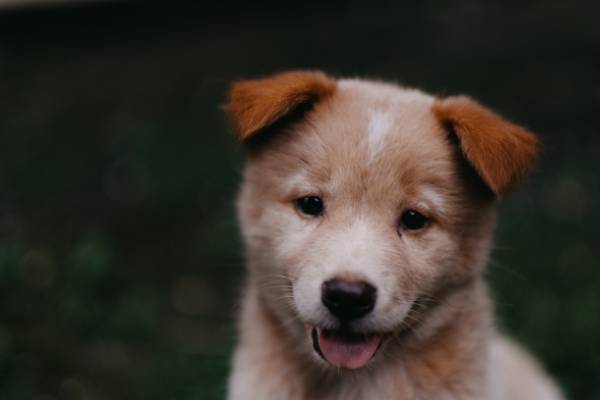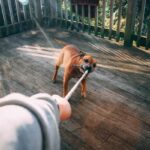Few things are cuter than a puppy’s oversized, floppy ears. However, puppies are born blind and deaf, unlike humans who are born with all five senses fully developed. So why do puppies open their ears, and when do they do so? Because puppies are an altricial species, they are born with their ears closed. Around two to two and a half weeks after birth, their ears start to open.
Puppies Are An Altricial Species
Puppies are helpless, mother-dependent creatures at the time of birth. Puppies are classified as an altricial species as opposed to precocial species, which are generally mature and mobile from birth.
Puppies born at birth lack the ability to regulate their body temperature and have brains that are still developing.
For warmth and nutrition, they are entirely dependent on their mothers. Puppies that are just born rely on their mother to eliminate as well. The mother dog encourages them to urinate and poop by using her tongue.
A newborn puppy has the ability to feel and taste, and he also has special sensors in his nose that enable him to sense warmth so that he can crawl toward his mother and other puppies.
He is able to right himself if he were to fall over. He will use vocalizations to entice his mother if he is cold or hungry.
When Do Puppy Ears Open
No matter if a newborn puppy has floppy or pointy ears, they are unable to hear anything in their new environment. Puppy hearing begins around the same time that they open their eyes.
The ear canals and other auditory structures in the ear move into position during the first two weeks of life due to variations in pressure. It’s best for puppies to be in a quiet setting because this is a delicate process.
At this young age, loud noises can permanently damage a developing dog’s hearing. Puppies can hear most sounds once their ear canals have opened, and their ears will finish growing in about a week.
When a puppy learns to hear, his hearing is much more acute than a human’s. If you’ve ever wondered why your dog can hear the UPS truck before you, it’s because dogs have a four-times greater hearing range than humans do.

Dogs can hear a much wider variety of sounds than humans can, including very high-pitched noises like dog whistles, and many dog toys have a high-pitched squeak that attracts their attention.
The breed is the best predictor of whether or not a dog’s ears will stand up.
By the time they have finished teething, at around five months, puppies in breeds with a typical wolf-like appearance, like the German Shepherd, typically have their ears up.
This is roughly how long it takes for the cartilage to develop and become strong enough to support the weight of the pinna with the right nutrition.
However, some German Shepherds can take up to seven months, and some have been known to have ears that only erupt after a year. However, the deadline is usually seven months.
Why Do Puppies’ Ears Stand Up
Most of the time, a dog’s ear will stand up due to genetics. The upright, alert ears of the wolf are inherited by dogs from the more wolf-like breeds.
Similar to Corgis and Chihuahuas, smaller dogs have been bred to have straight ears, with droopy-eared individuals typically being removed from the breeding program.
Why Are Puppies Born With Their Ears Closed
A newborn puppy cannot see or hear until he is more developed because altricial species are born in a relatively primitive state.
Due to the fact that a puppy’s eyes and ears are still developing and would be seriously harmed by exposure to light and sound at birth, both of these organs are closed and sealed when the animal is born.
As a result, a puppy’s ears do not open until it is more developed because his neural system is not yet prepared for processing auditory information. This is probably the price to pay for a dog’s shorter gestation period since any sound in an unprotected ear at this stage would cause permanent damage.
In fact, an altricial species’ gestation period is very short in comparison to a precocial species’ gestation period.
Just keep in mind that whereas a dog’s pregnancy lasts, on average, 58 to 63 days, a precocial animal’s gestation period is relatively lengthy—mares’ pregnancies last, on average, 11 to 12 months.
The stage when puppies are blind and deaf is referred to as the neonatal stage. It’s anticipated that this phase will last two weeks.
Pay Attention To Puppy Ear Problems
A puppy’s ear infection before the age of six weeks can be serious because it can spread quickly. Antibiotics and ear cleaners that could help an older puppy with an ear infection can, however, be too harsh on a recently born puppy’s ears.
Puppy head shaking or rubbing of the ears on the floor are indications of an ear infection. Additionally, there might be redness near the ear canal. An infection may also be present if a puppy’s ears smell bad.
Why Do My Puppy’s Ears Suddenly Start Drooping
As they mature, puppy ears change. When a puppy is teething, it’s common for ears that were perfectly upright before three months to start drooping once more. This is due to the fact that nutrients previously going to the ears are now going to the developing teeth.
At about six months old, the ears will typically stand up straight again after the teething process is over.
The puppy may go through a number of very natural stages on the way to fully erect ears. German Shepherds may develop side-flopping ears from their small, floppy beginnings.
This could develop into “flying nun” ears, where one ear is down and the other looks like it wants to take off.
Flying nun ears may be flopping over the top of the head during the comb-over stage, which usually comes after the stage of flying nun ears. All of this is a typical step in achieving perfectly erect ears.
Have your veterinarian check for any trauma or inflammation in the ear that may be causing the puppy’s down ear if you are worried about it. Check your puppy’s sleeping patterns to see if there is anything physically wrong.
They might always have one ear squashed and be lying on one side. They can be urged to lie on the opposite side to even things out.





